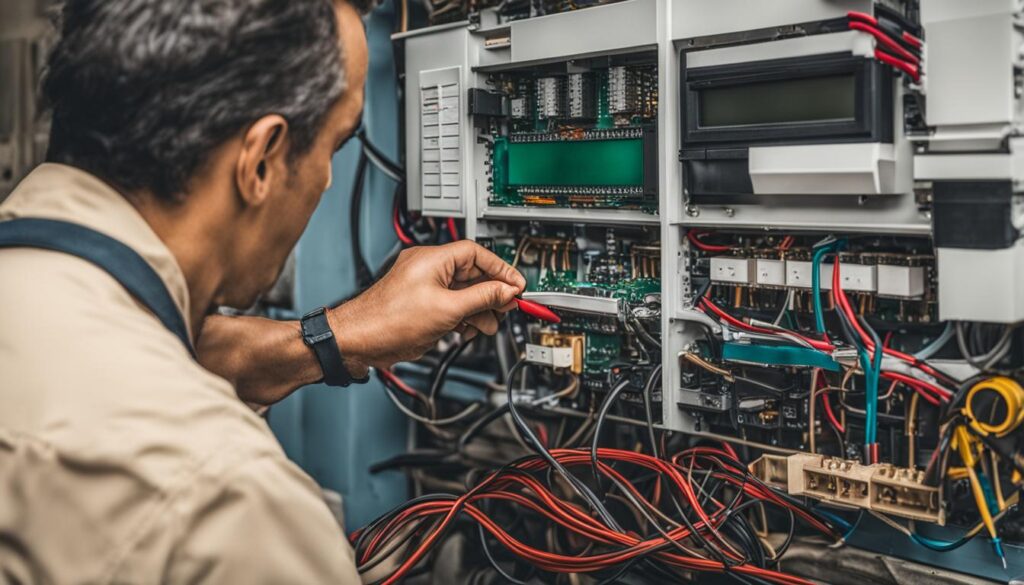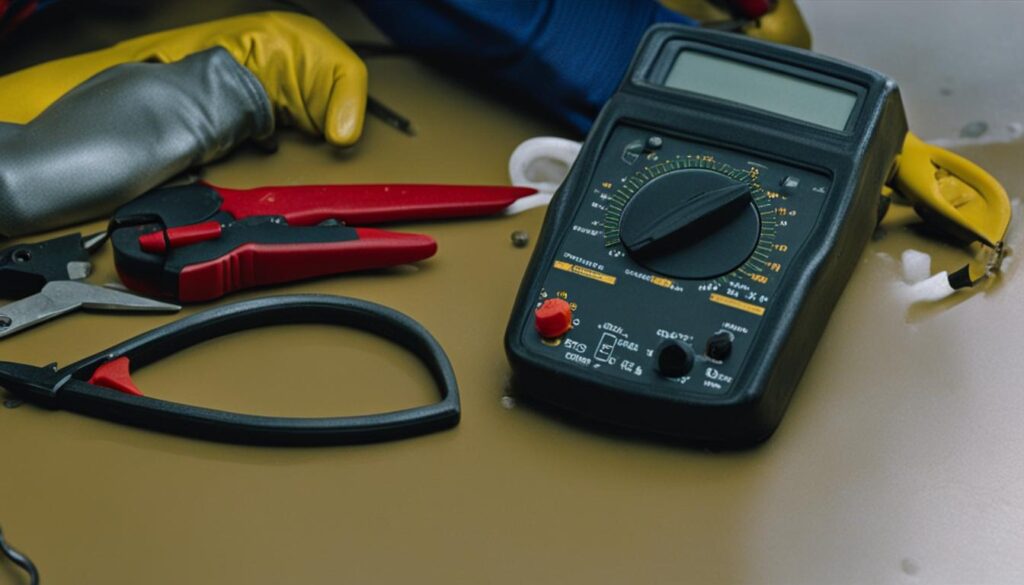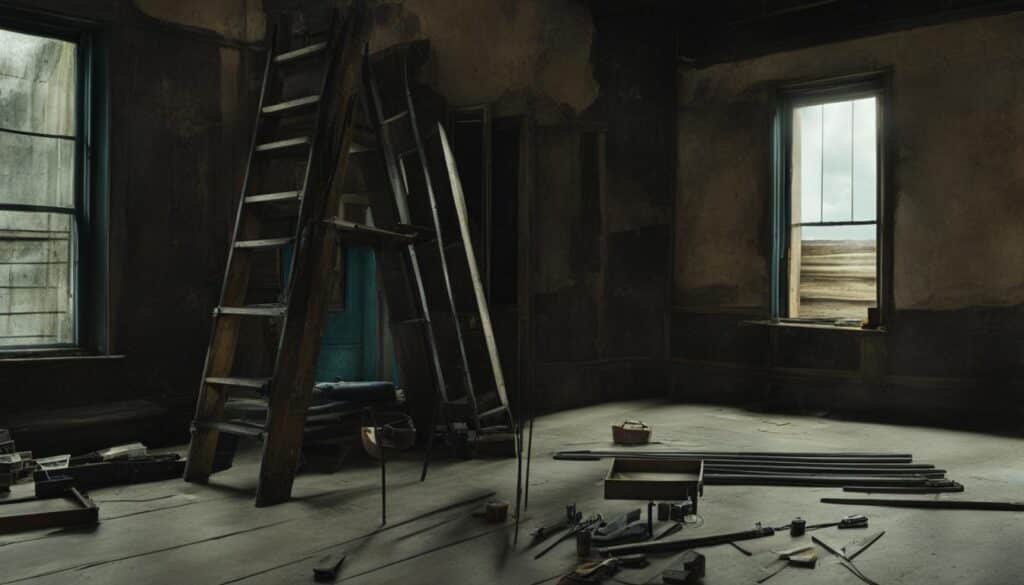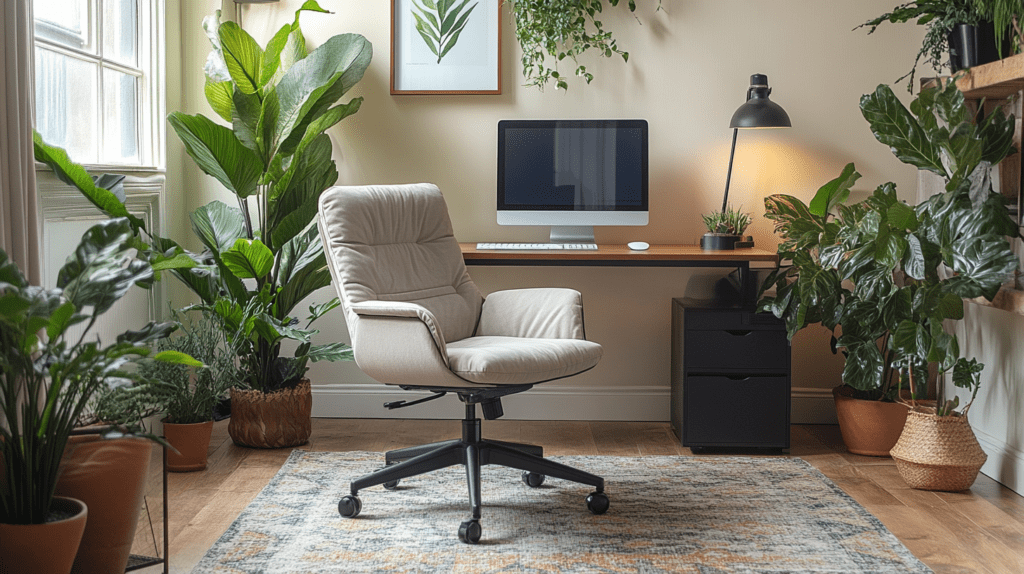
Key Takeaways:
- AC thermostat repair is a DIY task that can save you time and money.
- Regular maintenance is essential to prevent thermostat issues and optimize performance.
- Common problems with thermostats include calibration issues, faulty wiring, and temperature discrepancies.
- Troubleshooting techniques can help you identify and resolve thermostat problems.
- If you’re unsure or uncomfortable with DIY repairs, it’s best to consult a professional thermostat repair technician.
The Essence of Heating and AC Repair
Heating and AC systems are vital components in maintaining a comfortable living environment. Whether it’s battling chilly winter nights or scorching summer days, these systems work tirelessly to keep us cozy and cool. However, like any complex machinery, they can experience malfunctions that require repair. Understanding the essence of heating and AC repair is key to addressing these issues effectively.
When it comes to heating and AC repair, routine maintenance plays a crucial role in preventing system malfunctions. Regular inspections and upkeep can identify potential problems before they become major issues. From checking for refrigerant leaks to calibrating the thermostat, a well-maintained system ensures optimal performance and efficiency.
Common problems that require heating and AC repair include refrigerant leaks, malfunctioning compressors, and inaccurate thermostat calibration. A refrigerant leak can lead to decreased cooling efficiency, while a malfunctioning compressor can hinder the overall performance of the system. Accurate thermostat calibration ensures that the temperature settings are accurately reflected. These issues may seem daunting, but with the help of a professional technician, they can be resolved swiftly and effectively.
Whether it’s a simple calibration adjustment or a more complex repair, heating and AC systems require skilled technicians to diagnose and address the issues. With their expertise, trained professionals can ensure that your system is back up and running in no time. By entrusting the repair to professionals, you can have peace of mind knowing that your system is in capable hands.
READ: Calibrate Your Cooking: Expert Oven Thermostat Repair
Common Heating and AC Repair Issues
| Issue | Cause | Solution |
|---|---|---|
| Refrigerant Leak | Leaking refrigerant lines or connections | Sealing the leak and recharging the refrigerant |
| Malfunctioning Compressor | Faulty electrical components or compressor motor | Repair or replacement of the compressor |
| Inaccurate Thermostat Calibration | Misalignment or calibration issues | Recalibrating or replacing the thermostat |
By understanding the essence of heating and AC repair, you can appreciate the importance of routine maintenance and the need for professional assistance when problems arise. Remember, a well-maintained system ensures a comfortable living environment and helps to extend the lifespan of your heating and AC systems.
Why Regular Maintenance Matters
Regular maintenance is crucial for keeping your HVAC system in optimal condition. By investing in regular maintenance, you can save on utility bills, avoid costly repairs, and ensure the longevity and efficiency of your HVAC system.
Similar to regular check-ups for our health, routine inspections for your heating and AC system can catch potential issues before they escalate. HVAC systems, including heating and AC systems, are complex and consist of various components that require regular upkeep. Neglecting regular maintenance can lead to decreased energy efficiency, increased energy consumption, and a shorter lifespan for your system.
During regular maintenance visits, HVAC technicians will perform tasks such as cleaning or replacing filters, checking for leaks, and ensuring all parts are functioning properly. These maintenance tasks not only optimize system performance but also improve indoor air quality. By addressing potential issues early on, you can prevent major breakdowns and avoid the discomfort and inconvenience of a malfunctioning HVAC system.
| Benefits of Regular Maintenance | Consequences of Neglecting Maintenance |
|---|---|
|
|
Maximizing Energy Efficiency
One of the key benefits of regular maintenance is improved energy efficiency. HVAC systems that are not properly maintained can consume more energy to achieve the same level of heating or cooling. This not only leads to higher utility bills but also has a negative impact on the environment. Regular maintenance tasks, such as cleaning and calibrating system components, can optimize energy usage and reduce energy consumption, resulting in significant savings over time. Additionally, a well-maintained system also reduces the overall carbon footprint, contributing to a more sustainable future.
Prolonging System Longevity
Regular maintenance plays a major role in extending the lifespan of your HVAC system. Dust, debris, and wear and tear can cause components to malfunction or fail prematurely. Through routine inspections and maintenance, technicians can identify and address potential issues before they cause major damage. Additionally, regular maintenance helps ensure that all system components are working together seamlessly, reducing the likelihood of unexpected breakdowns and costly repairs. By investing in regular maintenance, you can maximize the lifespan of your HVAC system, saving you money in the long run.
Enhancing Indoor Comfort
Regular maintenance not only improves energy efficiency and extends system longevity but also enhances indoor comfort. A well-maintained HVAC system can provide consistent and reliable heating and cooling, ensuring a comfortable living environment in every season. Regular maintenance tasks, such as cleaning or replacing filters, can also improve indoor air quality by reducing allergens, dust, and pollutants. By investing in regular maintenance, you can create a healthier and more comfortable indoor space for yourself and your family.
Common Heating and AC Repair Issues and Their Solutions
Heating and AC systems can experience various common issues that can disrupt their efficiency and performance. It is essential to be aware of these problems and their solutions to ensure optimal functionality of your HVAC system.
One common issue is thermostat glitches, which can result in temperature discrepancies and an uncomfortable indoor environment. If you notice erratic temperature changes or your thermostat is unresponsive, it may require professional intervention to diagnose and resolve the issue.
Another common problem is refrigerant leaks. Refrigerant is crucial for the cooling process, and a leak can lead to reduced cooling efficiency. If you suspect a refrigerant leak, it is important to contact a professional Heating and AC repair technician who can locate the leak, repair it, and replenish the refrigerant.
Filter clogs are another common issue that can affect the airflow and air quality in your home. Over time, dust and debris can accumulate on the filters, inhibiting proper airflow and reducing the system’s efficiency. Regularly cleaning or replacing the filters can resolve this issue and maintain optimal system performance.
Lastly, drainage problems can occur within the HVAC system. If the drainage system becomes clogged or damaged, it can lead to water leaks and potential water damage. It is essential to address drainage issues promptly to prevent any further damage and maintain a safe and functional HVAC system.
| Common Heating and AC Repair Issues | Solutions |
|---|---|
| Thermostat glitches | Contact a professional technician to diagnose and resolve the issue. |
| Refrigerant leaks | Consult a professional to locate the leak, repair it, and replenish the refrigerant. |
| Filter clogs | Clean or replace the filters regularly to maintain proper airflow and system efficiency. |
| Drainage problems | Address drainage issues promptly to prevent water damage and maintain system functionality. |
It is important to address these common Heating and AC repair issues promptly to prevent further damage and ensure the comfort and safety of your home. Regular maintenance and timely professional intervention can help maintain the efficiency and longevity of your HVAC system.
Recognizing the Signs of Trouble
When it comes to your HVAC system, being able to recognize the signs of trouble can help you take prompt action and prevent further issues. From strange noises to unusual odors and temperature inconsistencies, these indicators can point to underlying problems that require attention. Here are some key signs to watch out for:
Noises:
If you hear unusual sounds coming from your HVAC system, it’s a sign that something may be wrong. Grinding, buzzing, or whirring noises can indicate issues with the motor, fan, or other components. Ignoring these sounds can lead to more significant problems down the line, so it’s important to address them promptly.
Odors:
Unpleasant odors emitted by your HVAC system could be a sign of trouble. A musty smell may indicate mold growth, which can impact indoor air quality and pose health risks. Burning or electrical smells can be a warning sign of overheating components, which should be addressed immediately to prevent potential fire hazards.
Temperature Inconsistencies:
If you’re experiencing inconsistent temperatures throughout your home, it could be a sign of HVAC system issues. Uneven heating or cooling can be caused by problems with the thermostat, ductwork, or airflow. Identifying and resolving these issues can help restore comfort and improve energy efficiency.
The Importance of Regular Maintenance
Regular maintenance is crucial for keeping your HVAC system in optimal condition. By conducting regular HVAC troubleshooting and inspections, you can identify and address potential issues before they escalate into major problems. This not only helps to ensure the efficiency and longevity of your system but also contributes to energy savings and improved indoor comfort.
HVAC Inspection Checklist
When it comes to regular maintenance, performing a thorough HVAC inspection is essential. Here are some key areas to focus on:
- Check HVAC filters: Clean or replace filters regularly to ensure proper airflow and prevent dust and debris buildup.
- Inspect HVAC parts: Examine components such as belts, motors, and fans for any signs of wear or damage.
- Look for HVAC leaks: Inspect the system for any leaks in the ductwork or refrigerant lines that may affect system performance.
By following this HVAC inspection checklist, you can address any issues promptly and keep your system running smoothly.
Regular maintenance and inspections are the key to preventing HVAC problems. By identifying and addressing issues early on, you can save yourself from costly repairs and ensure the optimal performance of your HVAC system.
The Role of HVAC Filters
HVAC filters play a vital role in maintaining indoor air quality and system efficiency. Clogged or dirty filters can restrict airflow and put strain on your system, leading to reduced performance and potential malfunctions. Regularly cleaning or replacing your HVAC filters is an important maintenance task that should not be overlooked.
| Benefits of Regular HVAC Maintenance | |
|---|---|
| Improved energy efficiency | Lower energy bills |
| Extended system lifespan | Reduced risk of breakdowns |
| Enhanced indoor air quality | Healthier living environment |
Regular HVAC maintenance can save you money in the long run by ensuring your system operates at peak efficiency, reducing energy consumption and preventing costly breakdowns. It also contributes to a healthier indoor environment by improving air quality and minimizing allergens and pollutants.
The Benefits of Hiring an HVAC Contractor
There are several benefits to hiring an HVAC contractor for your repair needs:
- Expertise: HVAC contractors have the knowledge and experience to diagnose and fix HVAC problems efficiently.
- Time-saving: Professionals can quickly identify the root cause of the issue and provide timely repairs.
- Safety: HVAC systems involve electrical components and potentially hazardous materials, so it’s safer to leave the repairs to trained professionals.
- Long-term savings: Properly repaired HVAC systems operate efficiently and consume less energy, resulting in long-term cost savings on energy bills.
While DIY repairs can be tempting, it’s important to weigh the risks and benefits before embarking on a repair project. In most cases, it’s wise to rely on the expertise of HVAC professionals to ensure that your system is repaired correctly and operates at its best.
Facing thermostat troubles at home and need help fast? Click here.
What to Expect During a Repair Visit
When you schedule a professional HVAC repair visit, you can expect a thorough assessment of your system, followed by a comprehensive diagnosis and a detailed repair plan. The technician will start by conducting an initial assessment to identify the specific problem and its underlying cause. This assessment typically involves inspecting various components, running diagnostic tests, and assessing the overall performance of your HVAC system.
Once the assessment is complete, the technician will provide a diagnosis, explaining the identified issue and its potential impact on your system’s performance. This diagnosis is crucial for understanding the exact nature of the problem and developing an effective repair plan. The technician will then present you with a repair plan that outlines the necessary steps and the associated costs involved in resolving the issue.
During the repair visit, open communication and transparency are paramount. The technician will explain the repair process, answer any questions you may have, and keep you informed about the progress. They will also provide you with an estimated timeline for completing the repairs. Throughout the visit, the technician will prioritize your satisfaction and ensure that the repairs are performed efficiently and effectively, restoring your HVAC system to its optimal condition.
Example Repair Plan
| Repair Item | Description | Cost |
|---|---|---|
| Thermostat Replacement | Replace the malfunctioning thermostat with a new programmable thermostat | $150 |
| Compressor Repair | Repair or replace the faulty compressor to restore proper cooling | $500 |
| Refrigerant Recharge | Recharge refrigerant to optimize cooling efficiency | $200 |
| Filter Replacement | Replace clogged air filters for improved air quality and system performance | $50 |
Cost Factors for HVAC and AC Repairs
When it comes to HVAC and AC repairs, several cost factors come into play. Understanding these factors can help you budget for the necessary repairs and make informed decisions. Here are the key factors that influence the cost of HVAC and AC repairs:
- Type and Extent of Repair: The type and extent of repair needed will play a significant role in determining the cost. Minor repairs, such as replacing a faulty thermostat or cleaning the coils, may be relatively inexpensive. However, major repairs, such as replacing a compressor or repairing a refrigerant leak, can be more costly.
- HVAC Contractor Rates: The rates charged by HVAC contractors can vary depending on factors such as their level of experience, reputation, and location. Highly experienced contractors or those in high-demand areas may charge higher rates for their services.
- Replacement Parts: The cost of replacement parts can also impact the overall repair cost. High-end HVAC brands or specialized parts may be more expensive to replace. It’s important to consider the cost of parts when budgeting for repairs.
It’s worth noting that labor costs are typically included in the overall cost of HVAC and AC repairs. HVAC technicians have the expertise and knowledge to diagnose the problem, make the necessary repairs, and ensure the system is functioning properly. They are trained to handle complex repairs and take the necessary precautions to ensure safety.
Before hiring an HVAC contractor, it’s advisable to obtain a detailed quotation that outlines the specific repair costs. This will help you understand the breakdown of costs and make an informed decision based on your budget and the complexity of the repair needed. It’s always a good idea to compare quotes from different contractors to ensure you’re getting the best value for your money while still receiving quality repairs.
| Cost Factors | Impact on Repair Cost |
|---|---|
| Type and Extent of Repair | Can vary from minor to major repairs |
| HVAC Contractor Rates | Higher rates for experienced or in-demand contractors |
| Replacement Parts | Higher cost for specialized or high-end brands |
By considering these cost factors and obtaining detailed quotes, you can better understand the expenses involved in HVAC and AC repairs. Remember to prioritize reliable and reputable HVAC contractors who can provide quality repairs. Investing in necessary repairs now can help prevent further damage and potentially save you money in the long run.
Tips for Choosing a Reliable HVAC Contractor
When it comes to HVAC repairs, finding a reliable contractor is crucial. The right HVAC contractor can ensure that your repairs are done correctly and efficiently, giving you peace of mind. Here are some tips to help you choose a reliable HVAC contractor:
- Experience: Look for contractors who have years of experience in the industry. Experienced contractors have the knowledge and skills to handle a wide range of HVAC issues.
- Licensing: Verify that the HVAC contractor you choose is properly licensed. A valid license ensures that they have met the necessary requirements and are qualified to perform HVAC repairs.
- Insurance: Make sure the HVAC contractor has insurance coverage. This protects both you and the contractor in the event of any accidents or damages that may occur during the repair process.
- Customer Reviews: Read customer reviews and testimonials to get an idea of the contractor’s reputation. Positive reviews indicate satisfied customers who were happy with the contractor’s work.
- Emergency HVAC Services: Consider hiring a contractor that offers emergency HVAC services. HVAC issues can arise at any time, and having a contractor who can provide immediate assistance can save you from unnecessary discomfort.
By following these tips, you can ensure that you choose a reliable HVAC contractor who will provide quality repairs and excellent customer service. Remember to do your research, ask for recommendations, and compare quotes from different contractors before making a decision.
READ: Stay Warm: Essential Heating Thermostat Repair Tips
Preventing Common HVAC Issues
Proactive measures can go a long way in preventing common HVAC issues and ensuring the longevity of your system. By prioritizing preventive HVAC maintenance, practicing regular maintenance habits, using your system properly, and taking immediate action when necessary, you can avoid costly repairs and maintain optimal system performance.
Preventive HVAC Maintenance
Regular preventive HVAC maintenance is essential for keeping your system in good working condition. This includes scheduling routine inspections and servicing by a qualified HVAC professional. During these visits, the technician will clean and lubricate components, check for any leaks or malfunctions, and address any potential issues before they escalate. By investing in preventive maintenance, you can catch problems early on and avoid expensive repairs down the line.
Additionally, changing or cleaning your HVAC filters regularly is a simple yet crucial preventive measure. Clogged filters can restrict airflow and put strain on your system, leading to decreased efficiency and potential breakdowns. By maintaining clean filters, you can improve indoor air quality and ensure smooth system operation.
Regular Maintenance Habits
In addition to professional preventive maintenance, there are regular maintenance habits you can adopt to keep your HVAC system running smoothly. These include keeping the outdoor unit clear of debris, such as leaves and branches, to promote proper airflow. Dusting and vacuuming vents and registers regularly can also help prevent blockages and maintain consistent airflow throughout your home.
It’s also important to regularly check and adjust your thermostat settings. Using your system properly, such as setting appropriate temperatures and utilizing programmable features, can help optimize energy efficiency and reduce strain on your HVAC system.
Immediate Action
When you notice any signs of trouble with your HVAC system, it’s crucial to take immediate action. Common signs include strange noises, unusual odors, inconsistent temperatures, or increased energy bills. Ignoring these indicators can lead to further damage and costly repairs.
If you’re experiencing any HVAC issues, it’s best to contact a qualified HVAC professional. Attempting DIY repairs without proper knowledge and expertise can worsen the problem or put your safety at risk. A trained technician can accurately diagnose the issue and provide the necessary repairs or adjustments to restore your system’s performance.
By following these preventive measures, practicing regular maintenance habits, and taking immediate action when needed, you can keep your HVAC system in optimal condition and minimize the risk of common issues.
Conclusion
In conclusion, understanding HVAC systems and how to maintain them is essential for ensuring indoor comfort and energy efficiency. Regular maintenance is key to keeping your HVAC system in optimal condition, preventing costly repairs, and maximizing its lifespan. By investing in routine inspections and proper care, you can enjoy significant savings on energy bills and avoid unnecessary discomfort.
FAQ
What are common issues that can occur with an AC thermostat?
Common issues that can occur with an AC thermostat include glitches, temperature discrepancies, and calibration problems.
Can I repair my AC thermostat on my own?
Some minor issues with an AC thermostat can be addressed with a DIY approach, but more complex problems should be handled by HVAC professionals.
How can I choose a reliable HVAC contractor for thermostat repair?
When choosing an HVAC contractor, consider factors such as experience, licensing, insurance, and customer reviews to ensure quality repairs.
What should I expect during a repair visit for my thermostat?
During a repair visit, the technician will conduct an initial assessment, diagnose the problem, and present a repair plan with associated costs.
How much do HVAC and AC repairs typically cost?
The cost of HVAC and AC repairs can vary depending on factors such as the type and extent of repair, the age of the system, and the rates of the HVAC contractor.
How can I prevent common HVAC issues?
Regular maintenance, proper use of your system, and taking immediate action at the first sign of trouble can help prevent common HVAC issues.








